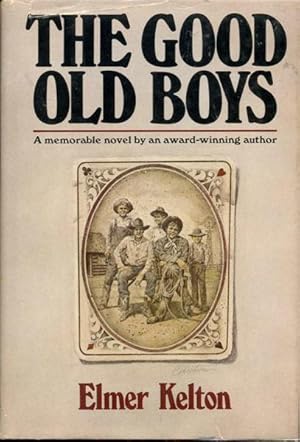
It had not been so long, really, since feathered Comanches had roamed these hills a-horseback, seeking after game, or occasionally in warpaint seeking honor and booty and blood. It was an ageless land where the past was still a living thing and old voices still whispered, where the freshness of the pioneer time had not yet all faded, where a few of the old dreams were not yet dark with tarnish. Even early in the novel, Kelton’s descriptions of the landscape are among the most beautiful passages I’ve read: “It was a comforting sight, this country. And I think if Kelton had sacrificed his research and his memoirs in favor of tightly crafted storytelling the way Austen did, this would have been a much, much finer novel. But here’s my problem: While Elmer Kelton takes somewhere between 120 and 150 pages to set up the socio-economic realities of his novel, Jane Austen managed the same in the very first sentence of Pride and Prejudice. I suppose that, given the beauty of the second half of the book, that wait might seem worth it. But before Kelton can let these characters live and breathe on their own, he feels the need to utilize them toward some other Purpose, with a capital P: namely, he needs to take the time to explain to us, in textbook detail, the harsh mechanics of ranch life, the prejudices of every class of character, and - most importantly - his conservative, anti-government political slant. Sure, the characters that start out as stolidly stereotypical do eventually develop distinct personalities, individual motives, a life outside the plot.

But my problem with it is this: it takes too damned long to get itself underway, and the labor doesn’t really pay off. It addresses issues of race and class, of politics, of environmentalism. I’ve labored long and hard with Elmer Kelton’s The Time It Never Rained, because it is an historical novel rooted firmly in a particular culture, a particular era, a particular economy. But such adjusting periods usually pay off because the literature is so rich and beautiful and, for the writer, informative about the possibilities in craft.

I labored with Dostoyevsky for example I even had to work at loving Chekhov.

There’s certainly something to be said for learning to appreciate an older style of writing. Wow! I haven’t posted an 11-11 reading update since March! But I have been reading from the list, gang, and I’ll be playing catch-up in my reviews every few weeks from now on.Īnd since I just finished a Western novel, Elmer Kelton‘s The Time it Never Rained, I might as well start with it:


 0 kommentar(er)
0 kommentar(er)
